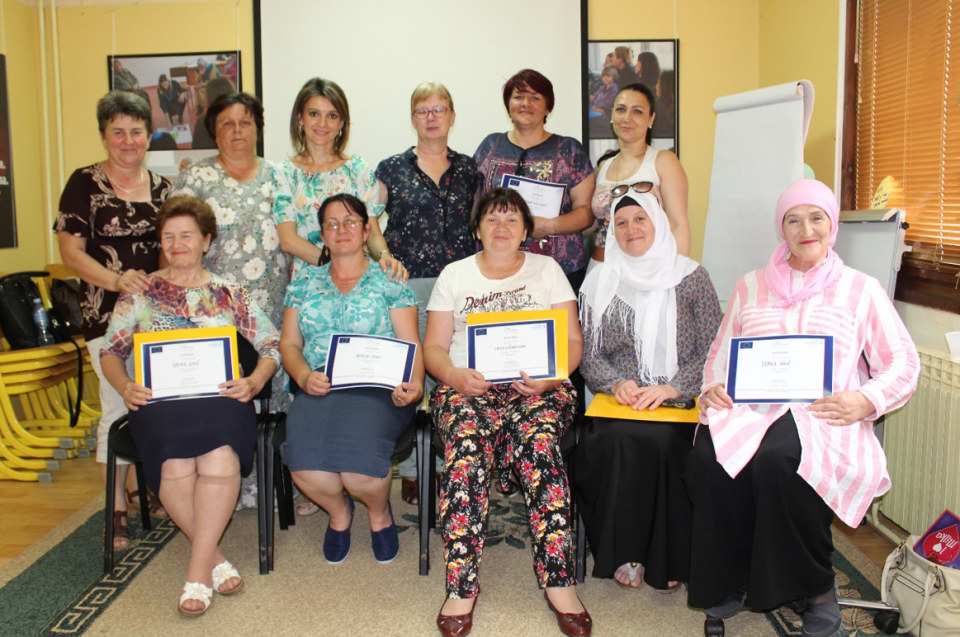No longer hidden: Survivors of violence in Bosnia and Herzegovina end their silence
Date:
Women survivors of violence in Bosnia and Herzegovina are breaking the stigma around violence against women by sharing their experiences with other survivors and the community at large. This initiative is led by NGO Vive Žene, with support from the EU-UN Women regional programme on ending violence against women in the Western Balkans and Turkey, “Implementing Norms, Changing Minds,” funded by the European Union.

Women survivors of violence in Bosnia and Herzegovina, who have left their abusers and broken the cycle of violence, fight the stigma and start speaking up about their experience through an initiative called “Women’s Support Chain”. The initiative brings together women who have survived different forms of violence and have been beneficiaries of the Vive Žene safe house in Tuzla, northeastern Bosnia and Herzegovina, which is a shelter for victims of domestic violence. The Women’s Support Chain empowers them to speak publicly –many of them for the first time – about their experiences of violence.
These women have survived different types of gender-based violence, including conflict-related and domestic violence, and they come from smaller urban and rural communities, where speaking openly about violence is often seen as taboo.
With support of UN Women and a dedicated team from Vive Žene, who have over 20 years of experience in fighting violence against women and girls by promoting nondiscrimination and gender equality, these survivors have reclaimed their space and their voice.
One of the results of the Women’s Support Chain initiative is a story compilation named “My Story – Women’s Support Chain.” The stories were written by eight women survivors of violence who, through this initiative, have felt empowered to speak up about what they have experienced in the hopes of helping someone else and bringing community attention to the problem. Their stories recount disturbing experiences of violence, but also offer messages of hope and inspiration.
“We shouldn’t be silent. We should speak up and ask for support. My message to every woman is to not put up with it, but to speak up and look for help,” writes Šemsa Kahrimanović, one of the women featured in this publication.
The Women’s Support Chain initiative was designed with the health and wellbeing of its members as the highest priority. Participants worked with Amra Muradbegović, a psychotherapist who specializes in psychodrama with a long experience of working with traumatized victims of violence and war. She emphasizes that the women, before engaging in this project, previously had the opportunity to process their experience of trauma and violence through psychotherapy.
“A plan was made at the beginning, which was to prepare the women for public speaking. The women were proud to undertake this task. This also motivated them to take new steps in their personal empowerment and created a feeling of responsibility as they would become an important part of the circle of support for other victims of violence,” said Muradbegović.
For the past ten months, the women have participated in group workshops and psycho-social education and training sessions on gender equality. In time, they were able to talk openly about gender-based violence. Even though sharing experiences brought back the trauma, the women learned how to better cope with their emotions, how to help other women to start talking about violence, and how to ask for help if they need it. By doing so, they also influenced the attitudes and behavior of others in their community to adopt the policy of zero tolerance to violence.
The Women’s Support Chain is part of the Gender Lab, an innovative regionwide initiative that tests and implements solutions to end violence against women and girls in the Western Balkans and Turkey, managed by UN Women and funded by the European Union under the programme “Implementing Norms, Changing Minds.”
“We expect them to continue to promote ending violence against women in their communities and to spread the message that life without violence is possible,” said Amra Muradbegović. These women now know they are not to blame for what they survived, but by openly sharing their stories and experiences, they can help other women who are suffering from violence and are afraid to speak out.